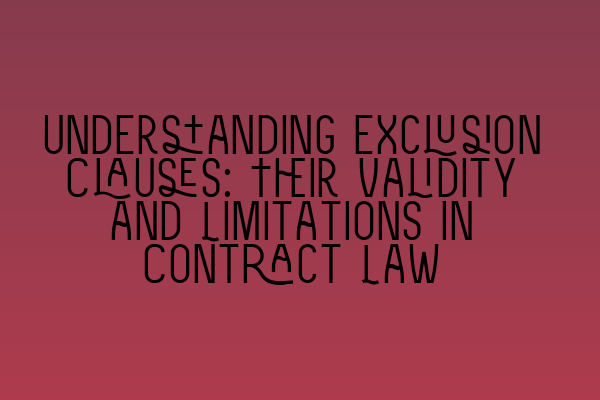Understanding Exclusion Clauses: Their Validity and Limitations in Contract Law
Welcome to SQE Contract Law! As solicitors specializing in contract law, we understand the importance of clear and concise agreements between parties. One crucial aspect of contract law is the inclusion of exclusion clauses, which can have significant implications for both parties involved. In this blog post, we will delve into the world of exclusion clauses, exploring their validity, limitations, and the potential impact they can have on contractual relationships.
To start, let’s define what exclusion clauses are. Simply put, exclusion clauses are contractual terms that aim to limit or exclude liability for certain events or circumstances. These clauses can be found in a wide range of contracts, such as lease agreements, insurance policies, and consumer contracts. The purpose of including an exclusion clause is to protect one party from potential liability, often by shifting the risk onto the other party.
Validity of Exclusion Clauses
The validity of an exclusion clause in a contract is determined by several factors. One crucial consideration is whether the clause has been properly incorporated into the contract. It is essential that the clause is clearly communicated to the other party and forms part of the agreed-upon terms. Failure to meet these requirements may render the exclusion clause unenforceable.
Additionally, the law imposes certain limitations on the validity of exclusion clauses. For example, under the Unfair Contract Terms Act 1977, exclusion clauses that attempt to exclude or limit liability for death or personal injury caused by negligence are generally considered unfair and unenforceable. Similarly, exclusion clauses that attempt to exclude or limit liability for fraud or breach of contract may also be subject to scrutiny.
Limitations of Exclusion Clauses
While exclusion clauses can provide protection to parties in a contract, their enforceability is not absolute. The courts have recognized certain limitations on the extent to which exclusion clauses can operate. One key limitation is the requirement of reasonableness. The Unfair Contract Terms Act 1977 sets out various criteria that must be satisfied for an exclusion clause to be considered reasonable. These criteria include the overall fairness of the clause, the bargaining power of the parties, and whether the clause was adequately brought to the other party’s attention.
Another important limitation is the requirement of clarity. Exclusion clauses must be clear and unambiguous in their language to effectively exclude liability. Ambiguous or confusing language may render the clause ineffective or give rise to uncertainty in its interpretation.
Impact on Contractual Relationships
The inclusion of exclusion clauses undoubtedly impacts the dynamics of contractual relationships. It is essential for both parties to carefully consider the scope and effects of these clauses before entering into an agreement. Parties relying on exclusion clauses may face resistance from the other party, who may perceive them as attempting to unreasonably limit their liability. Conversely, parties seeking protection may encounter pushback from those who argue that the clauses are unfair or unreasonable.
Ultimately, the validity and limitations of exclusion clauses depend on the specific circumstances surrounding the contract and the wording of the clause itself. It is crucial to seek legal advice from a qualified solicitor to ensure that your rights and interests are adequately protected.
At SQE Contract Law, we have a team of experienced solicitors who can provide expert advice on all aspects of contract law, including exclusion clauses. Contact us today to schedule a consultation and gain the clarity and understanding you need for your contractual relationships.
Related Articles:
Unveiling Real-Life Case Studies: Insights into Legal Practice and Decision-Making
Exploring Solicitor Salaries in the UK: Average Earnings and Factors Affecting Income
Mastering Client Relationship Management: Skills for Solicitors to Enhance Trust and Loyalty
Pursuing a Law School Education in the UK: Choosing the Right Path for Your Future
Securing Training Contracts: A Roadmap to Becoming a Solicitor
